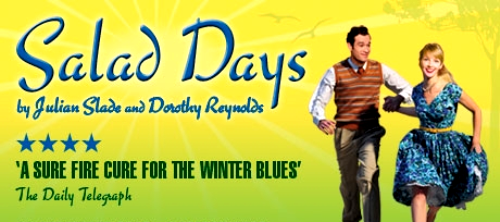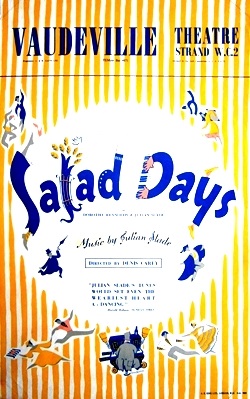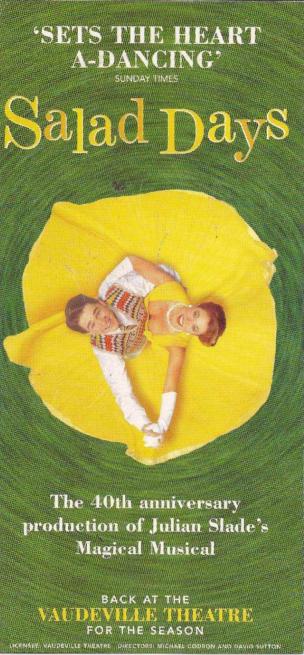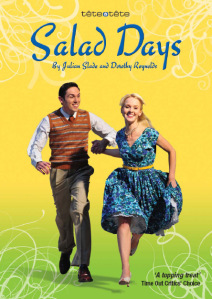
Ce musical au scénario farfelu a d’abord été joué pendant trois semaines au Bristol Old Vic. Il s'est ensuite joué pour une très très longue série dans le West End (devenant même le record de longévité à l'époque) et a été plus tard joué au Crest Theatre, Toronto - une production qui a été transféré à New York, où il n'a tenu l'affiche qu'une courte série de seulement 80 représentations.
Dans un 1954 ensoleillée, heureuse, optimiste et souvent absurde, Timothy et Jane obtiennent leurs diplômes universitaires. Ils sont amoureurx mais sous la pression de leurs parents, ils doivent trouver respectivement un emploi et un mari convenable. La famille de Timothy l’envoie rencontrer une série d’oncles influents et de plus en plus excentriques, tandis que la mère de Jane lui présente une série de maris potentiels éligibles mais ternes. Mais tout va être bousculé par une rencontre fortuite avec un clochard! Ce clochard leur confie pour un mois son piano de rue nommé Minnie et qui est magique en ce sens qu'il donne à chacun une irrésistible envie de danser. Excuse légitime pour quelques numéros enlevés dont le plus connu est « Look Ma I’m dancin' ». Une fois le mois terminé et après toutes sortes d’aventures merveilleuses - y compris un tour dans une soucoupe volante - Minnie le piano est transmis à un nouveau couple et Timothy et les familles de Jane sont réconciliés.
Ce scénario est totalement tiré par les cheveux mais reste délicieusment British…
Newly acquired BA gowns hang heavy on the shoulders of Jane and Timothy. Having got this far, what on earth do they do next? They could get married, of course (so they do), but how can they make a living? In a London park one breathlessly warm summer day they encounter a tramp who trundles round a mobile mini-piano. Even tramps need a holiday now and then, and he invites the young graduates to look after his business interests for a month at £7 per week plus whatever they can collect. The piano is not just any old mobile mini; those who hear it find themselves dancing, even against their better judgment. On this gentle thread of story is strung a series of revue-type scenes providing rich opportunities for versatile comedy players who can also sing and dance.
The story of Salad Days begins in the precincts of a University, where a Tramp is trying out a new melody on a battered old street piano. (Opening Music), His musings are soon interrupted by the arrival of a gaggle of Dons who have come to bid farewell to two departing graduates, Jane and Timothy. (The Things That Are Done By a Done). The young couple are sad to leave the University, but determined to face uptothe future. (We Said We Wouldn't Look Back). Their future, however, is uncertain, as both are being harassed by their parents, she to find a suitable husband, he a suitable job, following in the footsteps of one of his influential uncles. His troubles usually begin at breakfast. (Find Yourself Something To Do).
The pair arrange to meet in a London park. As usual, Jane is on time, Timothy is not. (I Sit In the Sun). They discuss their future and decide it would simplify life to marry each other and take the first job that comes along. This proves easy, for the Tramp arrives wheeling the old piano, and offers them seven pounds a week to look after it for a month. On hearing the Tramp play it, they discover to their amazement that the piano produces in them an irresistable urge to dance. (Oh, Look at Me!).
Timothy temporarily appeases his parents by going to the Foreign Office to see his Uncle Clam (Hush-Hush), but he is soon back in the park with Jane and the piano (now christened 'Minnie'), eager to discover if it will make everyone else dance too. Indeed it does - from street urchins to policemen to Bishops! (Oh, Look at Me: Reprise). It is not long before the park is full of people exhausted from dancing to Minnie's tune. (Out of Breath).
An admirer of Jane's, Nigel, not knowing that she is now secretly married, invites her to a night-club called 'The Cleopatra' where they witness a somewhat unusual cabaret (Cleopatra and Sand In My Eyes). On leaving the club they meet up with Tim, and he and Jane persuade a reluctant Nigel to try out his singing voice. (It's Easy To Sing)
News of the piano's irregular activities reaches the ears of the fun-hating Minister of Pleasure and Pastime who threatens to suppress it. Tim and Jane decide to hide Minnie, but find to their dismay she is really lost. (We're Looking For a Piano).
Jane meets the Tramp again, who does not seem at all perturbed by the disappearance of the piano, and she is able to relax for a while to enjoy the summer and sunshine. (The Time of My Life). She and Timothy receive unexpected help in their search from Tim's Uncle Zed, a zany scientist who conveniently descends in his flying saucer and whisks them off for a bird's-eye view… (The Saucer Song).
Meanwhile their anxious mothers lament that they never know what their children are up to. (We Don't Understand Our Children).
The piano is found, but the month of guardianship is over, and Minnie must be handed on to the next young couple - Nigel and his newly found girl-friend Fiona. Nigel finds, to his surprised delight, he can play as well as sing. (Oh, Look at Me: Reprise).
It is hard for Tim and Jane to see the piano go, but, having each other, they are hopeful of a future as happy as the past. (We Said We Wouldn't Look Back: Reprise).
1 Salad Days peut-être considéré comme un Top musical
Salad Days est présenté en création mondiale au Royaume-Uni au Theatre Royal de Bristol en juin 1954, puis transféré au Vaudeville Theatre de Londres le 5 août 1954, où il se joue 2.283 représentations, ce qui en fait la plus longue série de l’histoire du théâtre musical avant d’être dépassé par "My Fair Lady" aux États-Unis. (1956) et "Oliver!" au Royaume-Uni (1960). Lors des Evening Standard Awards de 1955, Salad Days a reçu le "Award for Most Enjoyable Show" (bien que "The Pajama Game" ait remporté le prix de meilleur musical).
Le critique de The Guardian écrit : "There is no pointed satire, only a passable line of wit, but the effect is one of genuine high spirits and those who liked it on Thursday were ready to call it the gayest piece of entertainment since The Mikado. Others were heard to compare it to a children's party, meaning that they found the fun jejune, 'undergraduate,' and limited."
La première canadienne de "Salad Days" en 1956 a eu lieu au Hart House Theatre de l’Université de Toronto pendant plusieurs mois, avec Barry Morse comme metteur en scène et Alan Lund comme chorégraphe. Le spectacle est transféré au Royal Alexandra Theatre, puis au Her Majesty’s Theatre de Montréal.
Morse fait reprendre la production au Crest Theatre, à Toronto, puis l’amène à New York. La production de New York, mettant en vedette Richard Easton, a ouvert ses portes au Barbizon Plaza Theatre le 10 novembre 1958 et n'a tenu l'affiche que 80 représentations. Morse a décrit ce théâtre comme «not a Broadway theatre … a perfectly comfortable and centrally situated theatre which was housed in a hotel.» Pour expliquer l'échec, il a rajouté « as rotten luck would have it there was a newspaper strike which started just a few days before we opened.» Il n’y avait pas de critiques, et le spectacle a fermé en Janvier 1959 quand, selon Morse, "nos ressources financières ont été épuisées.»
Le spectacle a eu un revival dans le West End en avril 1976 au Duke of York’s Theatre, où 133 représentations ont été jouées, et Elizabeth Seal en a fait partie. "Salad Days" est encore repris en avril 1996 au Vaudeville Theatre de Londres, mis en scène par Ned Sherrin et mettant en vedette Simon Connolly, Nicola Fulljames et Richard Sisson. Dans sa critique pour The Guardian, Michael Billington a écrit : « Time has also changed both the show and our attitude towards it. What seemed hopelessly innocent in 1954 has now acquired the patina of camp.»
Aucun dossier informatif complémentaire concernant Salad Days
Aucun dossier informatif complémentaire concernant Salad Days
Le titre est tiré de Antoine et Cléopâtre de William Shakespeare : "My salad days, When I was green in judgment, cold in blood, To say as I said then!" et l’expression a fini par être utilisée généralement pour désigner les jours d’inexpérience de la jeunesse. La popularité durable du musicale résid dans son innocence légère et sa simplicité apparente, en contraste avec les nombreux musicals américains durs de l’époque, et sa musique brillante, y compris les chansons « We Said We Would Not Look Back », « I Sit in the Sun », et « We're Looking for a Piano ».
Le musical a été parodié, d’une manière particulièrement sanglante, par Monty Python dans leur sketch "Salad Days" de Sam Peckinpah.

Version 1
Salad Days (1954-08-Vaudeville Theatre-London)
Type de série: OriginalThéâtre: Vaudeville Theatre (Londres - Angleterre)
Durée : Nombre : 2283 représentationsPremière Preview : 05 August 1954
Première: 05 August 1954
Dernière: InconnuMise en scène : Denis Carey • Chorégraphie : Elizabeth West • Producteur : Star(s) : Avec: Eleanor Drew (Jane), John Warner (Timothy), Newton Blick (Tramp), James Caimcross, Michael Aldridge, Dorothy Reynolds

Version 2
Salad Days (1958-11-Barbizon Plaza Theatre-Off Broadway)
Type de série: Original Off-BroadwayThéâtre: Barbizon Plaza Theatre (Broadway (Off) - Etats-Unis) Durée : Nombre : 80 représentationsPremière Preview : 10 November 1958
Première: 10 November 1958
Dernière: InconnuMise en scène : Barry Morse • Chorégraphie : Alan Lund • Blanche Lund • Producteur : Star(s) : Avec: Richard Easton / Jack Creley / Eric Christmas / Helen Burns / Barbara Franklin / Norma Renault / Powys Thomas / Gillie Fenwick / Mary Savidge / Tom Kneebone

Version 3
Salad Days (1961-12-Prince's Theatre-London)
Type de série: RevivalThéâtre: Shaftesbury Theatre (Londres - Angleterre) Durée : Nombre : 46 représentationsPremière Preview : 26 December 1961
Première: 26 December 1961
Dernière: InconnuMise en scène : Julian Slade • Chorégraphie : Diana Murdoch • Producteur : Star(s) : Avec: Alan Hockey (Tramp), Sheila Chester (Jane), Derek Holmes (Timothy), Bob Harris (Troppo), Pat Michael, Richard Fraser

Version 4
Salad Days (1964-08-Lyric Hammersmith Main House-London)
Type de série: RevivalThéâtre: Lyric Hammersmith (Londres - Angleterre) Durée : Nombre : 39 représentationsPremière Preview : 18 August 1964
Première: 18 August 1964
Dernière: InconnuMise en scène : Jasmine Dee • Chorégraphie : Producteur : Star(s) : Avec: Trevor Griffiths (Trump), Belinda Carrol (Jane), Philip Blaine (Timothy), Patrick Duggan (Troppo), Pat Michael, Richard Fraser, Barry Howard, Olivia Breeze, John Inman

Version 5
Salad Days (1976-04-Duke of York's Theatre-London)
Type de série: RevivalThéâtre: Duke of Yorks Theatre (Londres - Angleterre) Durée : Nombre : 133 représentationsPremière Preview : 14 April 1976
Première: 14 April 1976
Dernière: InconnuMise en scène : David Conville • Chorégraphie : Wayne Sleep • Producteur : Star(s) : Avec: Bill Kerr (Tramp), Christina Matthews (Jane), Adam Bareham (Timothy), Louis Hammond (Troppo), Sheila Steafel, Elizabeth Seal, Ian TalbotCommentaires longs: This production originated at the Theatre Royal, Windsor.

Version 6
Salad Days (1996-04-Vaudeville Theatre-London)
Type de série: RevivalThéâtre: Vaudeville Theatre (Londres - Angleterre) Durée : 4 mois 1 semaine Nombre : 148 représentationsPremière Preview : 17 April 1996
Première: 18 April 1996
Dernière: 24 August 1996Mise en scène : Ned Sherrin • Chorégraphie : Lindsay Dolan • Producteur : Star(s) : Avec: David Morton (Tramp), Nicola Fulljames (Jane), Simon Connolly (Timothy), Richard Sisson (Troppo), Elizabeth Counsell, Gay Soper, Kit Hesketh-Harvey, Sarah MortimerCommentaires : This production originated at the Yvonne Arnaud Theatre, Guildford and was mounted to mark the 40th anniversary of the show - although it was actually 42 years since its London premiere. It ran just under five months.

Version 7
Salad Days (2009-11-Riverside Studios-London)
Type de série: RevivalThéâtre: Riverside Studios (Londres - Angleterre) Durée : 1 semaine Nombre : Première Preview : 13 November 2009
Première: 13 November 2009
Dernière: 22 November 2009Mise en scène : Bill Bankes-Jones • Chorégraphie : Queeny Sachs • Producteur : Star(s) : Avec: Matthew Hawksworth (Tramp), Michelle Francis (Jane), Sam Harrison (Timothy), Lee Boggess (Troppo), Claire Machin, Sophie-Louise Dann, Emma Burford, Ellie Robertson, Richard Suart, Andrew Ahern, Graham Howes, Spencer O’Brien.Commentaires : The performing area at the Riverside Studios had been transformed into a park, with acres of Astroturf, and the audience sitting at white garden tables and served Pimms and cucumber sandwiches. At certain points in the show the audience were actively encouraged to get out of their seats and join in the dancing.

Version 8
Salad Days (2010-12-Riverside Studios-London)
Type de série: RevivalThéâtre: Riverside Studios (Londres - Angleterre) Durée : 1 mois 3 semaines Nombre : Première Preview : 09 December 2010
Première: 14 December 2010
Dernière: 06 February 2011Mise en scène : Bill Bankes-Jones • Chorégraphie : Queeny Sachs • Producteur : Star(s) : Avec: Matthew Hawksworth (Tramp) , Katie Moore (Jane) , Sam Harrison (Timothy) , Lee Boggess (Troppo) , Ellie Robertson, Andrew Ahern, Spencer O’Brien, Luke Baker, Rebecca Caine, Charlie Cameron, Emma Harris, Mark Inscoe, Richard Kent, Kathryn Martin, Tanya Stephens, Tony TimberlakeCommentaires : This was a revival of the show which ran at the Riverside Studios the previous November. There were a few changes of cast.

Version 9
Salad Days (2017-08-Union Theatre-London)
Type de série: RevivalThéâtre: Union Theatre (Londres - Angleterre) Durée : 3 semaines Nombre : Première Preview : 16 August 2017
Première: 16 August 2017
Dernière: 09 September 2017Mise en scène : Bryan Hodgson • Chorégraphie : Jo McShane • Producteur : Star(s) :
Pas encore de video disponible pour ce spectacle